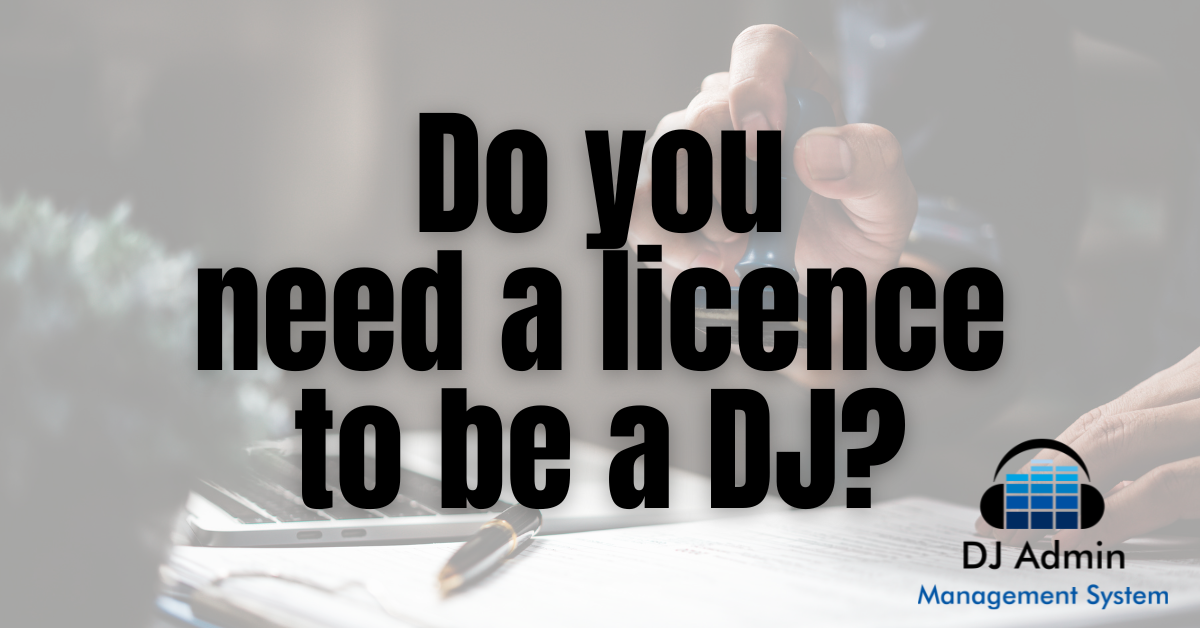Blog - Do you need a licence or training to be a DJ in the UK?
A popular question that crops up regularly is whether you need a licence or a qualification to be a DJ in the UK?

In short there isn't such a thing as a "licence" or a widely recognised qualification to be a DJ in the same way that you need a licence to drive a car or spend years at medical school to become a DR. Although there may be companies offering qualifications unfortunately these rarely amount to much apart from personal satisfaction.
However, there are a few things to consider that you might need in order to be a DJ. Although not a licence to operate, it is good practice for DJs to have Public Liability Insurance (PLI) and regularly test their equipment - you'll often see this referred to as Electrical Equipment Testing (EET) or the old name Portable Appliance Testing (PAT). And it's worth considering what (if any) music licences are needed as well as any contracts that should be in place.
Music Licences
There are a few licences that you may need to consider:
- PRS music licence
- PPL music licence
- ProDub music copying licence
These music licences can be confusing to understand so it's important to understand if you really need them. They will quite happily take your money and give you a licence but you may not actually need them - as some DJs have found! For the majority of family events, either there is no licence needed or it'll be covered by the venue's licence.
The ProDub licence is required for anyone that makes copies of or "format shifts" their music. Put simply, if you copy or change the format of the music, for example if you copy your CDs onto your laptop you will need this licence. If all you do is download your music in a digital format to be used then you are not changing the format of the music and therefore don't need to worry about this licence.
Public Liability Insurance (PLI)
Public Liability Insurance is there to protect you in the event of an accident or claim against your business. Several DJ associations offer PLI as part of their membership so it's foolish not to have PLI in my view; as you can get some for under £50 a year it's a small price to pay to protect you.
Electrical Equipment Testing (EET) formerly referred to as Portable Appliance Testing (PAT)
There are a lot of myths around electrical testing that this has to be done annually. The truth is there is no legal requirement specifying the frequency of testing - see the official advice from the Health & Safety Executive:
"The Electricity at Work Regulations 1989 require that any electrical equipment that has the potential to cause injury is maintained in a safe condition. However, the Regulations do not specify what needs to be done, by whom or how frequently (ie they don't make inspection or testing of electrical appliances a legal requirement, nor do they make it a legal requirement to undertake this annually)."
Source: http://www.hse.gov.uk/electricity/faq-portable-appliance-testing.htm
It is widely accepted that the standard is for testing to be carried out annually as well as visibly inspecting your equipment every time you use it.
DJ Contracts
You'll also want to consider how you confirm your bookings with your clients. Booking forms are a useful contract between yourself and your client. There are lots of examples available and will vary to suit the types of events.
DJ Training
There are plenty of options to help you learn new skills as a DJ, both directly to help you as a DJ and to help you run a business.
There are lots of providers for training including Digital DJ Tips, Pro Mobile Conference and SEDA Buzz to name just a handful. You can also find plenty of great advice out there from people like Alan Berg (Wedding Business Solutions), Jack Quenby and Faye Cornhill (The Wedding Business Club).
Conclusion
So in a nutshell there isn't a "licence" or widely recognised qualification to be a DJ, but there are some things to consider to run your business safely and legally.
Legal disclaimer: This blog has been written as a guide and does not constitute legal advice; that's what you pay lots of money to people who specialise in law!
Your Comments
No comments added, add yours below...



